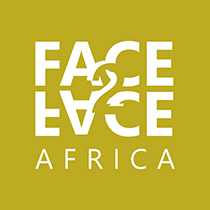Sam Okyere – 29-year-old Ghanaian resident in South Korea – recently condemned the actions of some high school students as racist. This has sparked a lot of controversy in the media and among some internet users in the Asian country.
On August 3, students of the Uijeongbu High School posted, among many other graduation pictures, a photo that sought to parody the viral video of the dancing Ghanaian pallbearers. This image of the high school graduate is not the first imitation of the pallbearers who dance as they carry the coffin during a funeral. However, this particular one ruffled the feathers of Okyere and many other people because the students decided to paint their faces black.
In a short write-up posted on his Instagram feed, Okyere described the picture as unfortunate and saddening. He said in the post, “Black people are very offended by such actions. I understand you wanted to reenact the culture but painting the face was not needed. I wish there aren’t such actions in Korea. Please, let’s respect each other’s cultures.”
The idea of painting one’s face black, known as blackface, invokes a racist and painful history for black people. In the mid-19th century, white performers darkened their skin with polish and cork to look stereotypically “black” in what was referred to as minstrel shows.
With tattered clothing and other exaggerated features, the first minstrel shows mimicked enslaved Africans on Southern plantations, depicting black people as lazy, ignorant, cowardly or hypersexual. The performances were intended to be funny to white audiences. But to the black community, they were demeaning and hurtful.
The action of these young students who ostensibly may not know the history and repercussion of their actions follows a lengthy history of politicians, celebrities and people across the globe who have perpetuated this unfortunate act that has left a damaging legacy in popular culture, especially in art and entertainment.
“This ignorance cannot continue!” is a statement some people who disagree with Okyere have tried to use against him, even causing the TV personality who recently described as the most famous black man in South Korea to apologize.
Notwithstanding the apology, Okyere was right. Ignorance is not an excuse. The need for education is heightened by the disappointing and underwhelming response of the Uijeongbu High School. In a statement put out by the school authorities, they said, “The parody graduation photos that our students took was just a parody without any other intention. People are saying they’re looking down on black people and being racist, but if they were white, our students would’ve painted their faces white. I wonder if people would’ve said they were looking down on white people if they had done that”.
This clearly points to a lack of understanding of the problem at hand, justifies the anger of Okyere as well as other well-meaning people who continue to condemn such acts and bring people’s attention to all that is wrong with it.
Instead of looking at the nuances of the actions of these students and learning from it, Okyere has been the target of hate by some sections of the South Korean country. Shifting the goal post, critics have resorted to blaming Okyere for posting the already public pictures of the students and the school without permission, taking issue with his use of the hashtag #teakpop, something that is seen as a derogatory expression used when discussing Korean culture and pulling a 2015 video of him pulling the corners of his eyes back, a commonly used racist gesture against East and Southeast Asians.
There was also a failed petition to have Okyere who has been granted permanent residence deported. According to the petitioners, Korea had provided him with convenience and security he would not have been able to enjoy in Ghana. The petition link was revoked shortly after it was put out.
Okyere was accepted into the Korean Government Scholarship Program in 2009 to study Computer Science at Sogang University in Seoul. After his studies, Okyere has been working in the Korean entertainment industry, having appeared on popular TV shows, drama, reality TV, movies and modeling stints. In 2017, he was named in the Forbes 30 under 30 Asia, Entertainment category as well as Best Foreign Entertainer at the 2018 First Brand Awards. He’s also partnered with World Vision to build the 572 Schools in rural communities in Ghana. He applied for permanent residency in 2019 and was accepted.
Despite the attempts to have his head, people also took to Twitter to show their support for the young man who has built a career for himself as one of the most influential foreign entertainers in the Korean show business. #I_Stand_with_Sam_Okyere was used widely to show solidarity.
“Blackface is part of a history of dehumanization, of denied citizenship, and of efforts to excuse and justify state violence. From lynching to mass incarceration, whites have utilized blackface (and the resulting dehumanization) as part of its moral and legal justification for violence. It is time to stop with the dismissive arguments those that describe these offensive acts as pranks, ignorance and youthful indiscretions. Blackface is never a neutral form of entertainment, but an incredibly loaded site for the production of damaging stereotypes…the same stereotypes that undergird individual and state violence, American racism, and a century worth of injustice”.
– David Leonard, chair of Washington State University’s department of critical culture, gender, and race studies, “Just Say No To blackface: Neo Minstrelsy and the Power to Dehumanize”. Published in his 2012 Huffington Post essay.




